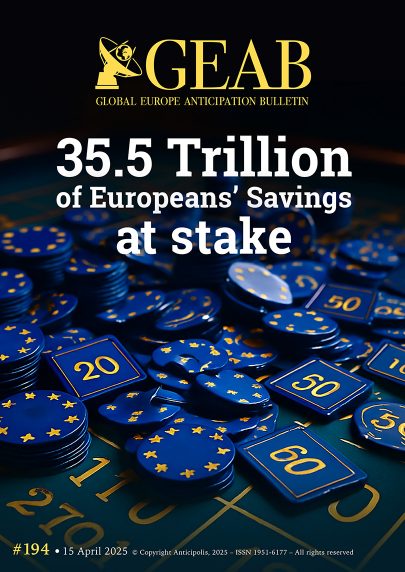GEAB 194
Stock markets are reeling in the wake of Donald Trump’s thunderous announcements.
Is the US ruled by an erratic and reckless leader? Or are we witnessing the emancipation of politics from the ‘dictatorship’ of the markets? If it’s the latter, what strategic goals is the President truly pursuing, beyond merely declaring the return of politics after 40 years of It’s the economy, stupid[1]? As always, in this article our team seeks to provide a systemic perspective by trying to gain a better understanding of the visions and strategies at work from the very top of the Western edifice of power… which is not just Donald Trump, by the way.

We will also ask ourselves whether the tariffs are not the finger pointing to the moon: is the stock market crisis really only due to the US President’s tariff threats?
“Globalisation has failed”
For the last 30 years at least, we have witnessed with a certain libertarian-anarchist enthusiasm at first, then with growing concern, the takeover of the world by non-democratic economic and financial bodies, de facto uncontrollable because driven solely by the mechanics of financial gain, inevitably disconnected in the long run from the interests of the people, but which nevertheless consider themselves more efficient at managing the world than States under the pretext of mathematical rationality.
Our team, for its part, has always had doubts about the prospect of the disappearance of states, which was very much in vogue in the previous decade.
Login

35,500 billion euros is the total amount of European savings. It's also the level of US federal debt. In twenty years, that debt has gone from 5% to 123% of [...]
Europe has long benefited from a powerful economic engine: the household savings. Built up over decades, this financial cushion, estimated at 35.5 trillion euros (against 14 trillion public debt), has [...]
At the crossroads of a Russian past, an American present and a European future, Ukraine, which for the last 3 years has been a testing ground for the wars of [...]
The dread of the climate crisis could soon be replaced by that of a "global seismic crisis", i.e. a gradual increase in the number and severity of earthquakes. If we [...]
After almost 20 years of anticipating the collapse of the Western-centric system, the GEAB now feels it has a duty to continue to identify the crises in the making, but [...]
As in every stock market crisis, stocks will change hands. Insofar as the crisis is largely provoked, it is likely that state structures - starting with the United States - [...]


Comments